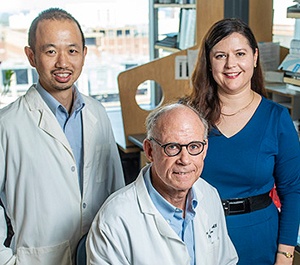Stephen Doster
-

Cancer Moonshot award to help map tumor progression
A trans-institutional team of researchers at Vanderbilt University Medical Center and Vanderbilt University has received an $11 million Cancer Moonshot grant to build a single-cell resolution atlas to map out the routes that benign colonic polyps take to progress to colorectal cancer, the third most common cancer among both men… Read MoreOct. 9, 2018
-

Santoro to step down as department chair of PMI
After serving as the department’s leader for more than 15 years, Samuel A. Santoro, MD, PhD, the Dorothy B. and Theodore R. Austin Professor and Chair of the Department of Pathology, Microbiology and Immunology, will step down from his role as the department’s chair… Read MoreOct. 9, 2018
-

How microvilli form
The gut is lined by cells containing brush borders, which are composed of arrays of microvillar protrusions that help in nutrient absorption and provide a barrier against pathogens and toxins. Microbes such as E. coli can destroy microvilli with potentially life-threatening results. But how microvilli form has not been well understood. Using… Read MoreOct. 9, 2018
-

First Islet Workshop draws international audience
More than 200 investigators from across the globe who specialize in islet biology, the study of hormone-producing cell clusters in the pancreas known as islets, recently gathered in Nashville to share knowledge and present the challenges and successes of their work during the first Islet Biology Workshop at Vanderbilt. The loss… Read MoreOct. 9, 2018
-

Research reveals link between immunity, diabetes
When it comes to diet-induced obesity, your immune system is not always your friend. Adipose (fatty) tissue is infiltrated by white blood cells that have been linked to the development of inflammation, insulin resistance and type 2 diabetes. How this happens is complicated and under intense investigation by researchers around the… Read MoreOct. 9, 2018